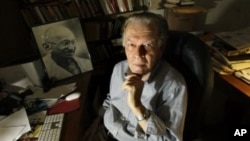The popular uprisings in the Middle East, which began at the end of last year, continue to grip countries across the region. Though the outcomes of the protests have varied, from country to country the protesters for the most part have used a similar set of tactics. What few people realize is that the philosophical underpinnings for these tactics can be traced to a 93-year-old retired professor, in Boston, Massachusetts.
Since the firsts protests broke out in December, authoritarian dictators in Tunisia and Egypt have been forced to step down. Other countries have been forced to enact political reforms. And even those governments which have resisted the uprisings have found themselves on the defensive.
Across the region and throughout the so-called “Arab Spring,” media outlets report that organizers of the protests have been following the principles laid down by this man, retired professor Gene Sharp, in a book called From Dictatorship to Democracy.
“This was written in 1993, but it was based upon at least two decades of previous research and drafting," said Gene Sharp.
Professor Sharp originally wrote the book at the request of political dissidents in Burma. Since its original publication, the work has been published in thirty-four different languages.
“It was translated into Arabic," said Sharp. "It was on the website of the Muslim brotherhood, which may surprise many people.”
Sharp works out of an otherwise-ordinary Boston neighborhood, which bears little resemblance to Cairo’s Tahrir Square. But his theories are strikingly related to the events that transpired in Egypt.
“They seemed to have very good planning," he said. "And for quite some time, they also managed to communicate with the masses of people the importance of losing fear.”
Sharp’s ideal of peaceful resistance borrows influences from Gandhi, Henry David Thoreau and Albert Einstein - also an advocate of nonviolence. Einstein, in fact, wrote the preface to Sharp’s first book, and Sharp calls the non-profit organization which supports his work the “Albert Einstein Institution.”
At the center of Sharp’s work is the principle of nonviolent struggle. His methods are known for their practicality and effectiveness.
“I’m trying to examine how nonviolent struggle has been operated," said Professor Sharp. "And sometimes it fails for awhile, and sometimes it succeeds. But how can you wage nonviolent struggle more skillfully while using your mind to plan?”
Sharp’s tactics for nonviolent struggle have had worldwide influence. His ideas were used - among other places - in the “color” revolutions of Eastern Europe during the early 2000's. Retired Army Colonel Robert Helvey used Sharp’s tactics to train activists in Burma and Serbia.
“Gene has planted these ideas among people for 40 years, and now they are sinking in and people are adopting them as part of their own belief system as if they’ve always been here," said Robert Helvey.
Professor Sharp continues to write at the organization he founded in 1983. He just finished his newest book, Sharp’s Dictionary of Power and Struggle. It will be published this fall.




